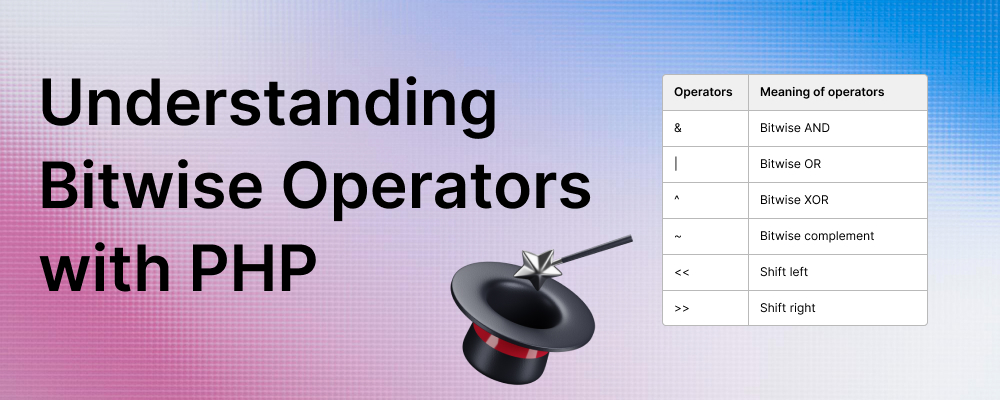Understanding Bitwise Operators with PHP
- Date
-
 Oleg Charnyshevich
Oleg Charnyshevich
In this tutorial, you will learn about all 6 bitwise operators in PHP programming with examples.
In the arithmetic-logic unit (within the CPU), mathematical operations like addition, subtraction, multiplication, and division are done at the bit level. Bitwise operators are used to performing bit-level operations in PHP programming.
Introduction

Bit operations are rare in the PHP world, however, in books, articles, or other sources, you might find something like:
$memory = memory_get_usage() >> 20;
You may get confused. What is >>? So, let’s look at the
documentation
.
$a >> $bShift the bits of$a $bsteps to the right (each step means “divide by two”)
WTF?! Why do you need it at all?
Many people know that binary (or
base-2
) a numeric system that only uses two digits — 0 and 1. Computers operate in binary, meaning they store data and perform calculations using only zeros and ones. So, for example, a computer will represent the number 6 as 00000110.
Bit Rotation : A rotation (or circular shift) is an arithmetic operation.
- In the left rotation, the bits that fall off at the left end are put back at the right end.
- In the right rotation, the bits that fall off at the right end are put back at the left end.
Let’s back to our operator >>.
$n = 6; // 00000110
$k = $n >> 1; // 00000011
We can see that the bits that fall off at the right end are put back at the left end. So the current binary value 00000011 in decimal is 3. We just shifted one bit, and as a result, we divided the value by 2.
If we were to shift 2 bits, we would divide by 4.
If we were to shift 3 bits, we would divide by 8.
Wow, that’s the power of two!
Get back to the example >> 20. It means that we are dividing the value by 2 to
the power of 2
0.
It is easy to remember that 2 ^ 10 = 1024. So
$memory = memory_get_usage() / (1024 * 1024);
Since memory_get_usage() returns a value in bits, we just converted it to megabytes. It turns into a very handy function:
$memory = memory_get_usage() >> 10; // convert it to kilobytes (KB)
$memory = memory_get_usage() >> 20; // convert it to megabytes (MB)
$memory = memory_get_usage() >> 30; // convert it to gigabytes (GB)
$memory = memory_get_usage() >> 40; // convert it to terabyte (TB)
If right rotation means division, then left rotation, on the contrary, means multiplication.
$y = 5; // 000000101
echo $y << 2; // 000010100 (5 * 4 = 20)
Are there other operators besides right/left rotation?
There are 4 more operations - AND & , OR | , XOR ^, NOT ~. Let’s see it in action below.
What’s the best way to use bitwise operations?
The most convenient to use bitwise operations, not in multiplication and division, but is using a bitwise mask , for example, to differentiate access rights or other similar things.
We can turn four values into a four-bit value, in which 1 means the user has the given right, and 0 does not.
define('U_READ', 1 << 0); // 0001
define('U_CREATE', 1 << 1); // 0010
define('U_EDIT', 1 << 2); // 0100
define('U_DELETE', 1 << 3); // 1000
define('U_ALL', U_READ | U_CREATE | U_EDIT | U_DELETE); // 1111
In the first four lines, we defined the constants by shifting bits to the left. After that, we used the OR | operator on the last line. The
bitwise OR operator (|)
returns a 1 in each bit position for which the corresponding bits of either or both operands are 1s. Example:
$x = 3; // 0011
$y = 5; // 0101
echo $x | $y; // 0111 (7)
Therefore, we can set any permissions for the user:

$userPermission = U_READ; // Only read
$userPermission = U_READ | U_CREATE; // Only read and create
$userPermission = U_ALL ^ U_DELETE; // All rights except deletion
$userPermission = U_ALL & ~ U_DELETE; // Again all rights except deletion
In the example above, there are 3 new operators.
- A
bitwise XOR operator (^)
(performs the logical exclusive OR). It returns a
1in each bit position for which the corresponding bits of either but not both operands are1s. - The
bitwise AND operator (&)
returns a
1in each bit position for which the corresponding bits of both operands are1s. - The bitwise NOT operator (~) inverts the bits of its operand.
Example:
#XOR
$x = U_ALL; // 1111
$y = U_DELETE; // 1000
echo $x ^ $y; // 0111
#AND
$x = U_ALL; // 1111
$y = U_DELETE; // 1000
echo $x & $y; // 1000
#NOT
$y = U_DELETE | U_READ; // 1001
echo ~$y; // 0110 (inverted)
What happens if we use AND + NOT operators?
In the example below, use the two operators together. The bitwise NOT operator (~) will be executed first, followed by the bitwise AND operator (&).
...
$userPermission = U_ALL & ~ U_DELETE; // Again all rights except deletion
U_ALL 1111
~ U_DELETE 0111
RESULT 0111
Is there any difference between the XOR and AND + NOT operators?
The difference between these options is that in the first case, the bit switches. If it was 1, then it will become 0, and vice versa. The second option makes the bit equal to 0, regardless of its current value.
If we want to remove any access right, do the following:
$userPermission &= ~ U_DELETE; // prohibit deletion
A few more examples
To check the bits (in our case, the access rights), we can use the following conditions.
if ($userPermission & U_READ) // is there a right to read?
if ($userPermission & (U_READ | U_DELETE)) // is there a right to read or/and delete?
One more example
// A lot of code duplication
if ($error['type'] == E_ERROR
|| $error['type'] == E_PARSE
|| $error['type'] == E_COMPILE_ERROR) {}
//Better
if (in_array($error['type'], [E_ERROR, E_PARSE, E_COMPILE_ERROR])) {}
//Perfect)
if ($error['type'] & (E_ERROR | E_PARSE | E_COMPILE_ERROR)) {}
Although error codes in PHP are specially designed for bitwise operations, developers usually use comparison operators. But now you know a different approach 😉
Conclution
Thanks for reading this article! I hope you now understand bitwise operators and can utilize them in your PHP code (or in many other languages!). if you have any questions or comments, please reach me out on Twitter . I appreciate any feedback!
Stay tuned for new articles by following me on Twitter or Medium! Subscribe to my RSS.
Tags:
#php